‘Vous êtes anglais, je suppose?’ A question frequently posed to me in France. To which I reply: ‘C’est compliqué.’ To be honest, I’m not sure. If one passport is good, two are better. I have three. Crise d’identité.
In France, I am Irish, thanks to my grandmother, born in County Antrim. In Canada, I am Canadian, having been born there. Albeit I left aged ten months. In Britain, where I spent much of my childhood, I am British, as my parents were.
My British passport is essentially useless. It’s in a drawer somewhere. I don’t need it to fly to Britain
It’s the nationality equivalent of a multi-phasic personality disorder. I suppose I could now even get a French passport, but this seems greedy. It would theoretically permit me to be elected president, which would be to the great benefit of the Republic, but I’m not sure my neighbours would endorse my project of restoring the monarchy and driving on the left. I’ll stick to three for the moment.
My Irish passport, which I got after Brexit, is the most useful of my laissez passers, giving me unlimited access to the European Union and also to the United Kingdom. My Canadian passport is essential for getting into Canada and also allows me into the United States without a visa.
My British passport is essentially useless. It’s in a drawer somewhere. I don’t need it to fly to Britain. The Irish passport is just as good. The Canadians won’t let me into Canada with it, since I was born in Canada. And to go to America I must pay for an Electronic Travel Authorisation.
Some might accuse me of being opportunistic, even cosmopolitan. That’s probably true though I prefer to think of myself as practical. And also a trend setter. Almost everyone I know has at least two passports, or is desperate to have them. Slebs, too. Elon Musk is South African, Canadian and American. Nicole Kidman, Australian and American. Mo Farah, Somalian and British. Arnold Schwarzenegger, Austrian and American. David Byrne of Talking Heads (British, American) put his finger on the confusion this can generate in his song Life During Wartime: ‘I got three passports, a couple of visas. You don’t even know my real name.’
I travelled for years on my British passport in the halcyon days before Brexit. But then I had to go to Canada and apply for a $7 Canadian visa waiver online, a new requirement. The web form demanded: ‘Where were you born?’ Saskatchewan, was my honest reply. ‘You’re not eligible for a visa waiver,’ was the curt response. It informed me that I could only fly into Canada with a Canadian passport. The cost of this was $260.
I presented myself at the Canadian High Commission in Trafalgar Square where the passport office was full of accidental Canadians bitterly complaining at the cost of obtaining a Canadian passport after years of travelling to Canada using a British passport. The clerk was unyielding.
I subsequently flew into Montreal from Paris where I presented my new Canadian passport to the immigration officer. ‘Welcome home,’ he said. ‘This is not my home,’ I snarled.
Then, Brexit. Idiotically I voted for it, imagining that it could precipitate the welcome collapse of the absurd EU. It turns out that the EU is doing a remarkably good job of disintegrating without help from me. But my life was suddenly very complicated. I live in France and was faced with being limited to being here no more than 90 days every six months.
Grandma Edith to the rescue. Born in Belfast. Before the partition. The Irish government doesn’t care where you’re born on the island of Ireland. Only one Irish-born grandparent is required. But there are procedures. I needed her birth certificate, her marriage license, my mother’s birth certificate, her marriage license and my own birth certificate. Plus photos, proof of identity, proof of residence and more, all of it notarised by a solicitor.
It took me a year to assemble the dossier, which I submitted to the Irish Department of Foreign Affairs in Dublin. I was not the only Brit to have had this idea. All over the EU British expats with tenuous claims to Irish nationality were engaged in the same wheeze. Eventually, 80,000 of us applied. It took almost two years to get my Irish passport. It arrived on Saint Patrick’s Day, just before the deadline for me to be kicked out of France. Erin go Bragh.
An Irish neighbour in France asked me: so will you learn Irish? My grandmother’s mother tongue was in fact Yiddish, so no. (I did briefly have a look at Duolingo’s Irish course and concluded I’d never master it, even if I lived to be a million.)
The Irish manoeuvre has not been the only route to remaining in the EU sans souci. I’ve a friend whose family was forced out of Prague when the Germans invaded. He’s never been there but is now the proud possessor of a Czech passport. I have two Jewish friends whose families were forced out of Hitler’s Germany before the war. Both are newly minted citizens of the Bundesrepublik. (They tell me the German embassy in London was exceptionally helpful and efficient at processing their claims.) Another pal here has a Swedish wife and has copped a Swedish passport.
My Detroit-born wife (American, British) with family origins in Poland, investigated the Polish route but the Poles are impossible, demanding unobtainable documents – stupid because, as the Irish have discovered, it doesn’t hurt to have a substantial diaspora. She eventually obtained a renewable Titre de Séjour allowing her to stay in France for ten years. But she still has to queue in the non-EU lane at passport control.
For those without traceable roots to claim a second passport, there are a variety of options on offer, but they’re expensive and complicated and it often takes years to qualify. Spain, Portugal, Malta, Greece and Ireland all offer residency in return for substantial investments, leading in time to the possibility of citizenship. Vanuatu offers a passport for a mere $130,000 but it won’t let you live in the EU and most of us can’t even find it on a map.
Do I feel British? Canadian? Irish? Possibly none of the above. I’m the human equivalent of one of those Panamian ships owned by a Swiss stiftung and operated by a holding company in the British Virgin Islands. But I confess I’m definitely enjoying my Irish inner child.
We’ve taken to escaping France in the heat of the summer and renting a house in County Galway, exploring the magical coast of Connemara. The people are lovely, the food fabulous. That it’s constantly raining isn’t a problem. When God created Ireland, he forgot the roof. Tant pis.
Often my new Irish compatriots, confused by my accent, ask me: ‘Are you British?’
‘It’s complicated,’ I reply.







Comments